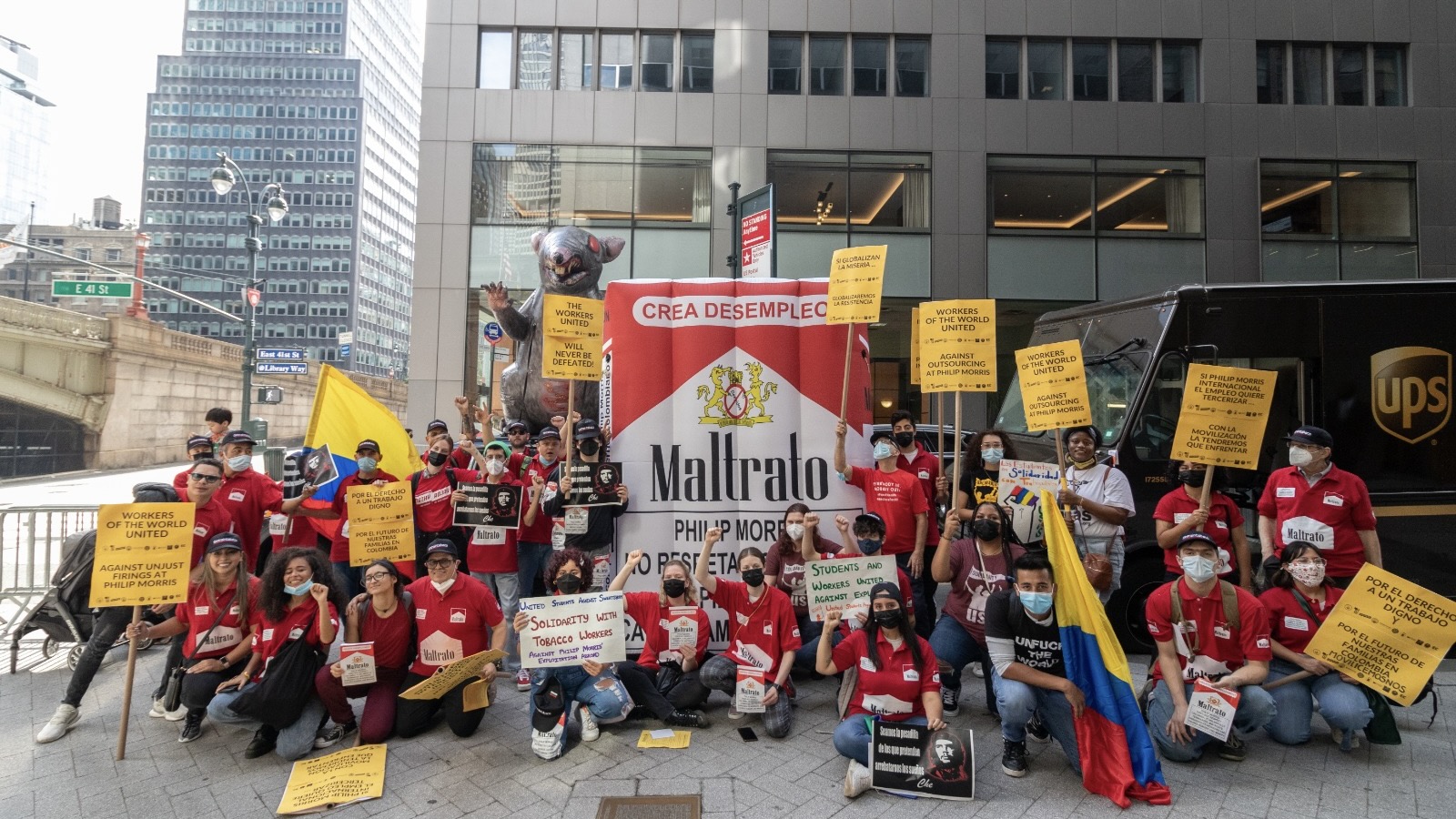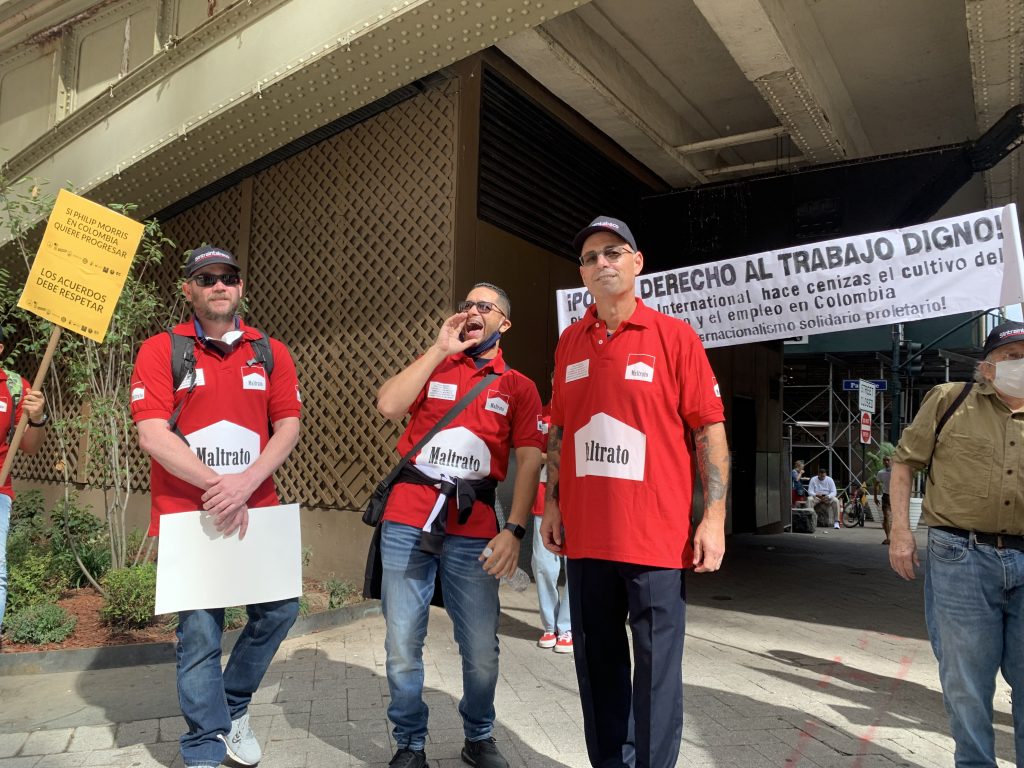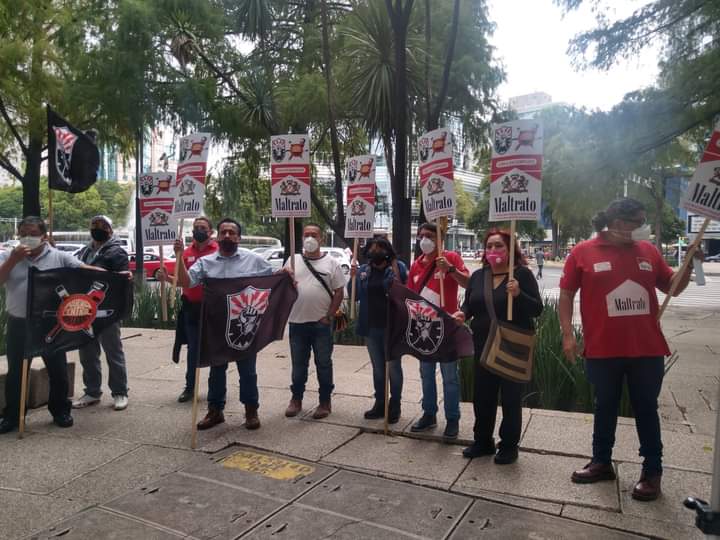The international day of action was organized to condemn the Tobacco giant’s anti-worker policies

Labor unionists and activists in Colombia, Mexico, and New York City, took part in protests against the largest tobacco company in the world, Philip Morris International, on Friday October 8. Philip Morris owns over 130 cigarette brands, including the world-famous Marlboro. Sintraintabaco, Colombia’s National Union of Tobacco Industry Workers, coordinated the protests as part of an international plan of action to call out the company’s anti-worker practices. These workers made history as it was the first ever international day of action against the tobacco giant.
Around 60 protesters rallied outside the Philip Morris office in midtown Manhattan, including members of the United Steelworkers Local 9620, United Students Against Sweatshops, and leading organizers of the Sintraintabaco.
Philip Morris also has a plant in Guadalajara, Mexico, which produces Marlboro and Delicados, one of the oldest cigarette brands in Mexico. Guadalajara is known as a paradise for multinational companies, infamous for its lax labor regulations. With the support of the New Center for Workers, Sintraintabaco rallied with Mexican workers in Mexico City and Guadalajara on October 8th day of action.

United Steelworkers Local 9620 member Carlos Arocho said “I think it’s important that all workers support each other because we suffer from the same struggles and the same problems in our workplaces. We are here to support whenever and wherever is necessary.”
Protesters in New York chanted: “If Philip Morris International wants to outsource our jobs, we will move to fight against it!”

Philip Morris’s sordid history in Colombia
In 2005, Philip Morris purchased Coltabaco, Colombia’s state tobacco company, and acquired more than half of Colombia’s tobacco production. It began a project to modernize the production plants, and restructure accounting and payroll, resulting in the dismissal of 600 workers. This policy of layoffs has only gotten worse year after year, with sales, marketing and distribution jobs within the company’s different cigarette brands being outsourced.
2019 saw the closure of a cigarette production factory in Medellín and a tobacco leaf treatment plant in Barranquilla. Since then Philip Morris has continued to lay off workers across the board. The company attributed the 2019 closings to several factors, including the increase in cigarette smuggling into Colombia.
After the closures in Medellín and Barranquilla in 2019, Minister of Agriculture Andres Valencia promised to work with Colombia’s National Federation of Tobacco Producers (Fedetabaco) on a strategy for tobacco growers to transition to producing other crops. No plan has been determined yet.
Tobacco in crisis
Tobacco’s crisis has been a long time coming. After the devastating health consequences of tobacco use became common knowledge, many countries implemented strict policies to curb use. These policies ranged from public service announcements, ad-campaigns, and even economic policies such as imposing high taxes on cigarettes. These campaigns have had varying degrees of success but in Colombia for example, the Ministry of Health reported a 4.6% reduction in tobacco consumption between 2013 and 2017 alone.
An unintended impact of the taxes on tobacco products was a significant increase in smuggling of cigarettes. A recent report by the Organized Crime and Corruption Reporting Project (OCCRP) revealed a network of Chinese tobacco subsidiaries using loose regulation within Panama’s Colón Free Trade Zone to import Chinese cigarettes tax-free and manufacture the brands within Panama. In July 2020, Colombian authorities confiscated a shipment of Chinese cigarettes, containing an estimated 100 million cartons.
Resistance is way forward
As the Sintraintabaco During the protest in New York City, Vildamir Forero, President of Sintraintabaco’s Barranquilla Board declared, “We dedicate ourselves to fighting for the rights of our people within our union against this transnational corporation. We’re glad to be here organizing against the abuses of this corporation and also the Colombian government.” He concluded his speech outside the Philip Morris offices in Manhattan by declaring: “If they globalize the misery, we will globalize the resistance!”
Monica Cruz is a reporter with US-based media outlet Breakthrough News.
Social media is bold.
Social media is young.
Social media raises questions.
Social media is not satisfied with an answer.
Social media looks at the big picture.
Social media is interested in every detail.
social media is curious.
Social media is free.
Social media is irreplaceable.
But never irrelevant.
Social media is you.
(With input from news agency language)
If you like this story, share it with a friend!
We are a non-profit organization. Help us financially to keep our journalism free from government and corporate pressure













0 Comments